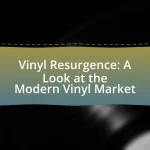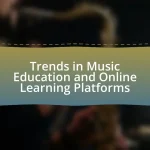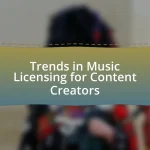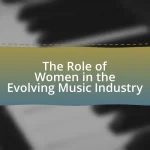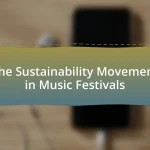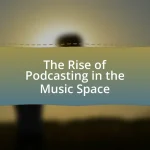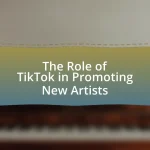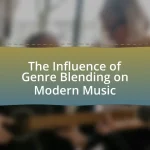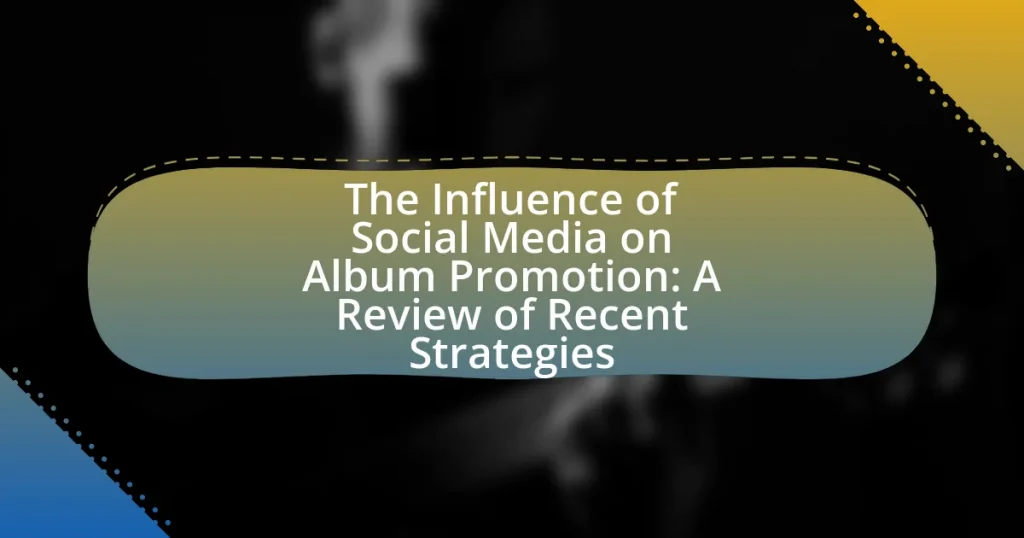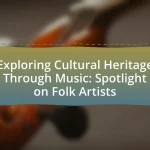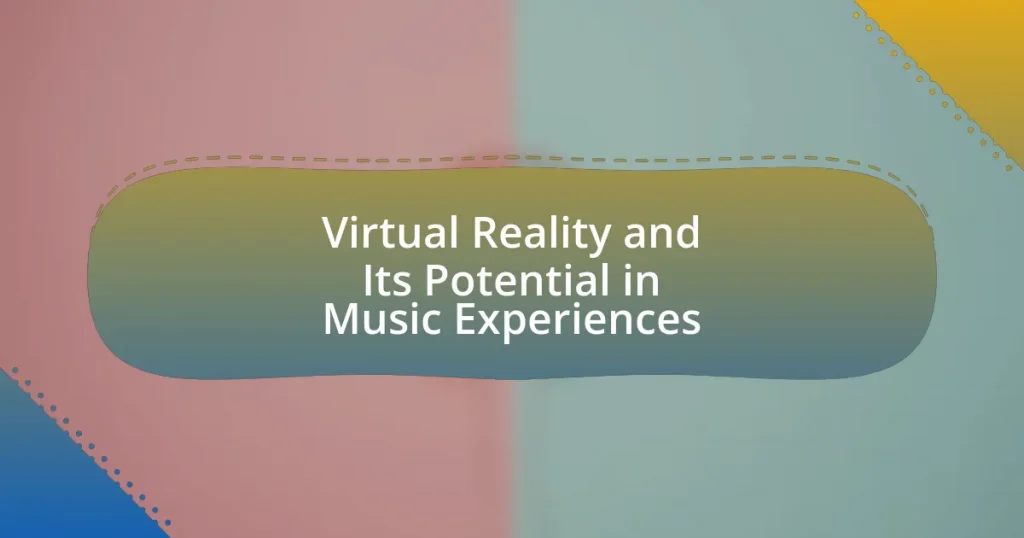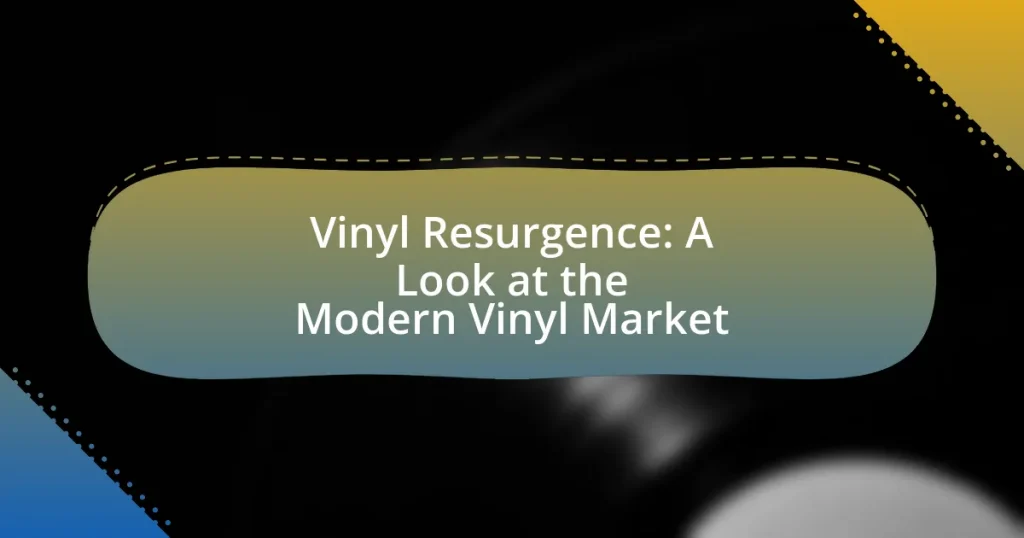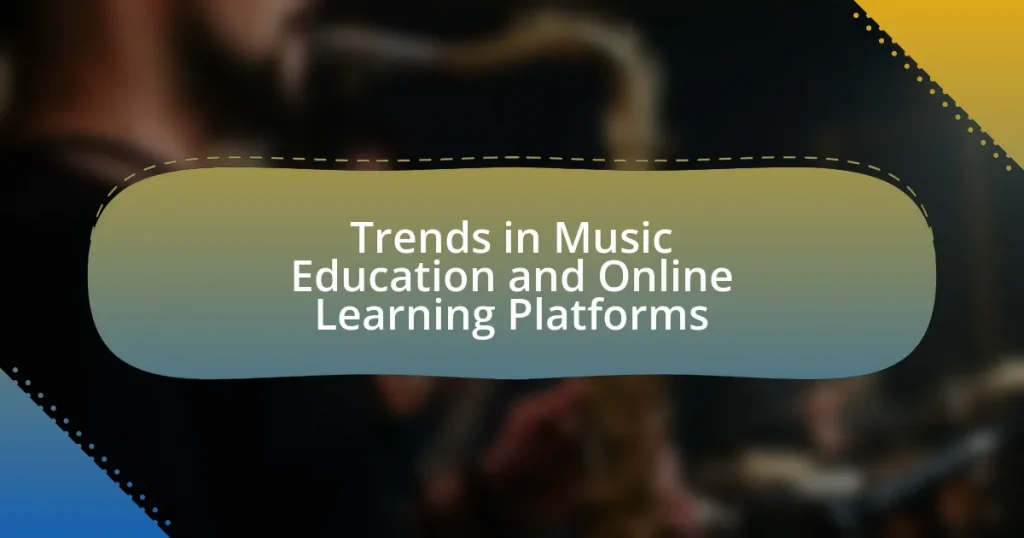The article examines the significant influence of social media on album promotion, highlighting how platforms like Instagram, Twitter, and TikTok provide artists with direct access to their audience and enable targeted marketing strategies. It discusses the transformation of promotional tactics, emphasizing the importance of real-time engagement and analytics in shaping listener preferences and driving album sales. Key strategies such as influencer partnerships, interactive content, and live streaming for album launches are explored, along with the challenges artists face in navigating social media dynamics. The article also outlines best practices for effective social media campaigns, focusing on audience engagement and content optimization to enhance visibility and impact.
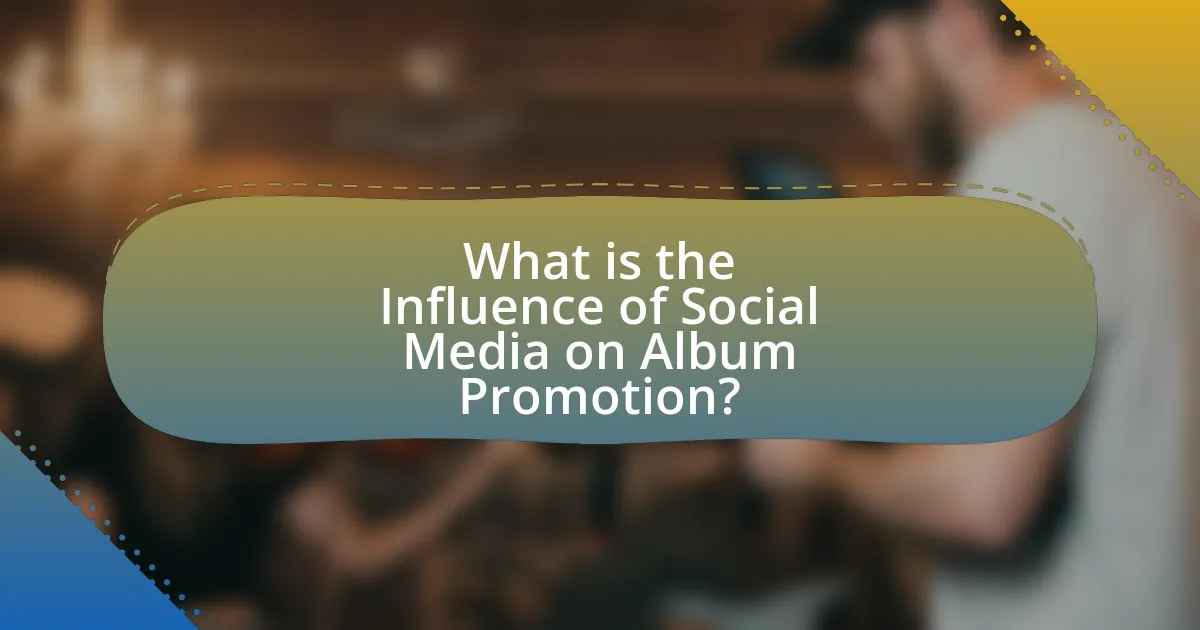
What is the Influence of Social Media on Album Promotion?
Social media significantly influences album promotion by providing artists with direct access to their audience, enabling targeted marketing, and facilitating real-time engagement. Platforms like Instagram, Twitter, and TikTok allow musicians to share teasers, behind-the-scenes content, and interactive posts that generate buzz and anticipation for new releases. According to a 2021 report by the International Federation of the Phonographic Industry, 75% of music consumers discover new music through social media platforms, highlighting their critical role in shaping listener preferences and driving album sales. Additionally, social media analytics provide artists and labels with valuable insights into audience demographics and engagement metrics, allowing for more effective promotional strategies tailored to specific fan bases.
How has social media changed the landscape of album promotion?
Social media has transformed album promotion by enabling artists to engage directly with their audience, fostering a more interactive and personalized marketing approach. Platforms like Instagram, Twitter, and TikTok allow musicians to share teasers, behind-the-scenes content, and live performances, creating buzz and anticipation around new releases. According to a 2021 report by the International Federation of the Phonographic Industry, 75% of music consumers discover new music through social media, highlighting its critical role in reaching potential listeners. This shift has led to a decrease in reliance on traditional media outlets, as artists can now leverage their social media presence to build a loyal fanbase and drive album sales effectively.
What are the key social media platforms used for album promotion?
The key social media platforms used for album promotion are Instagram, Facebook, Twitter, TikTok, and YouTube. Instagram is widely utilized for visual storytelling and engaging with fans through posts and stories, while Facebook allows for event promotion and community building. Twitter serves as a platform for real-time updates and interactions with followers. TikTok has gained popularity for its viral potential, enabling artists to create short, engaging videos that can reach a broad audience. YouTube remains essential for music videos and promotional content, providing a platform for artists to showcase their work and connect with fans. These platforms collectively enhance visibility and engagement, making them crucial for effective album promotion.
How do artists leverage social media for audience engagement?
Artists leverage social media for audience engagement by creating interactive content that fosters direct communication with fans. This includes live Q&A sessions, behind-the-scenes footage, and polls that encourage audience participation. For instance, a study by the Pew Research Center found that 69% of adults in the U.S. use social media, providing artists with a vast platform to reach and engage their audience effectively. Additionally, artists often utilize targeted advertising on platforms like Instagram and Facebook to promote their music and events, which can lead to increased fan interaction and loyalty.
Why is social media important for album promotion?
Social media is important for album promotion because it provides artists with a direct and cost-effective platform to reach and engage their audience. By utilizing social media channels, artists can share updates, teasers, and exclusive content, which fosters a sense of community and anticipation among fans. According to a 2021 report by the International Federation of the Phonographic Industry, 75% of music consumers discover new music through social media platforms, highlighting their critical role in influencing listener behavior and driving album sales.
What advantages does social media offer over traditional promotion methods?
Social media offers several advantages over traditional promotion methods, primarily through its ability to reach a larger audience at a lower cost. Unlike traditional methods such as print advertising or television commercials, social media platforms allow for targeted advertising, enabling promoters to reach specific demographics based on user data. For instance, a study by the Pew Research Center indicates that 72% of the public uses some type of social media, providing a vast pool for engagement. Additionally, social media facilitates real-time interaction and feedback, allowing artists to connect directly with fans, which enhances brand loyalty and engagement. This immediacy is not achievable through traditional methods, where feedback loops can take weeks or months. Furthermore, social media campaigns can be easily adjusted based on performance metrics, providing flexibility that traditional methods lack.
How does social media impact album sales and streaming numbers?
Social media significantly boosts album sales and streaming numbers by enhancing artist visibility and engagement with fans. Platforms like Instagram, Twitter, and TikTok allow artists to share promotional content, behind-the-scenes footage, and interact directly with their audience, creating a sense of community and anticipation around new releases. For instance, a study by the University of Southern California found that artists who actively engage on social media can see a 20% increase in streaming numbers compared to those who do not utilize these platforms effectively. Additionally, viral trends on social media can lead to increased interest in an album, as seen with the success of songs like “Old Town Road,” which gained traction through TikTok challenges, resulting in record-breaking streaming figures.
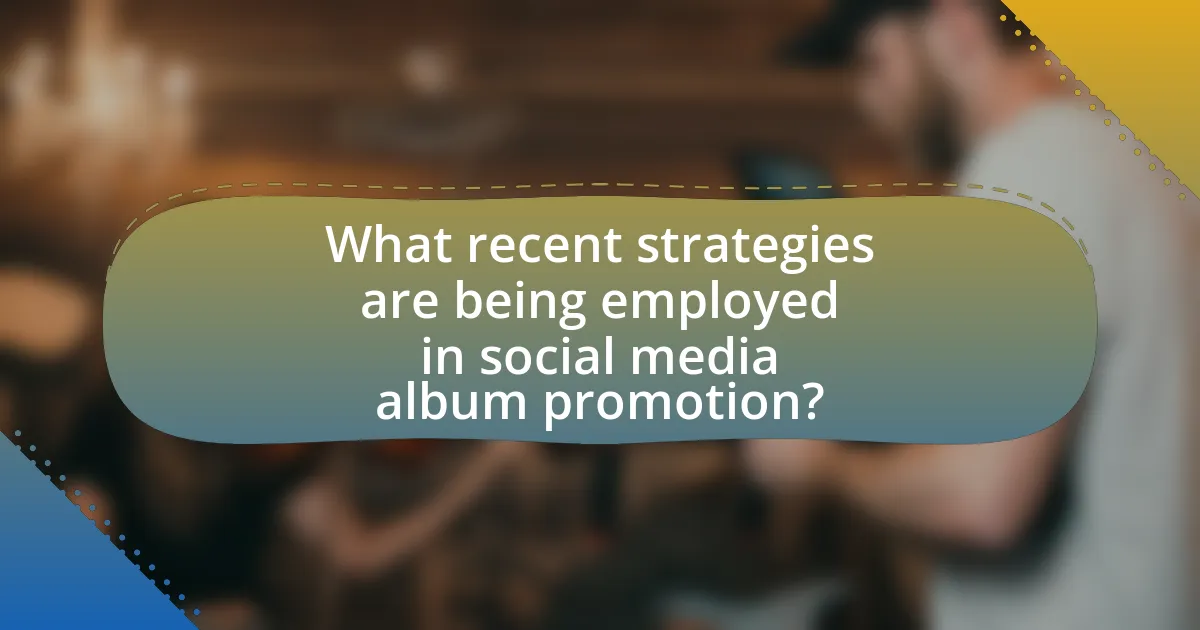
What recent strategies are being employed in social media album promotion?
Recent strategies in social media album promotion include leveraging influencer partnerships, utilizing targeted advertising, and engaging audiences through interactive content. Influencer partnerships allow artists to tap into established fan bases, enhancing visibility; for instance, collaborations with popular social media figures can lead to increased album streams and sales. Targeted advertising on platforms like Facebook and Instagram enables precise audience segmentation, ensuring promotional content reaches potential listeners effectively. Additionally, interactive content such as polls, live Q&A sessions, and behind-the-scenes footage fosters deeper engagement, encouraging fans to share and promote the album organically. These strategies reflect a shift towards more personalized and engaging promotional tactics in the digital landscape.
What innovative tactics are artists using on social media?
Artists are utilizing innovative tactics on social media such as interactive live streams, user-generated content campaigns, and strategic collaborations with influencers. Interactive live streams allow artists to engage directly with fans, creating a sense of community and immediacy; for instance, artists like Billie Eilish have hosted live Q&A sessions that boost fan interaction and promote new releases. User-generated content campaigns encourage fans to create and share their own content related to the artist’s work, exemplified by challenges on platforms like TikTok, which can lead to viral trends and increased visibility. Additionally, collaborations with influencers expand reach and tap into new audiences, as seen when artists partner with popular social media figures to promote their music, effectively leveraging the influencer’s established follower base for album promotion.
How are artists utilizing live streaming for album launches?
Artists are utilizing live streaming for album launches by hosting virtual events that allow them to engage directly with fans in real-time. This strategy enables artists to perform songs from the new album, share behind-the-scenes content, and interact through Q&A sessions, creating a more immersive experience. For instance, in 2020, artists like Travis Scott and Dua Lipa successfully launched albums through live-streamed concerts on platforms such as Fortnite and YouTube, respectively, attracting millions of viewers and generating significant buzz. This approach not only expands their reach but also fosters a sense of community among fans, enhancing the overall promotional impact of the album launch.
What role do influencers play in promoting albums on social media?
Influencers play a crucial role in promoting albums on social media by leveraging their large followings to create buzz and drive engagement. They share content related to the album, such as teasers, reviews, and personal endorsements, which can significantly increase visibility and reach. For instance, a study by the Digital Marketing Institute found that 49% of consumers depend on influencer recommendations when making purchase decisions, highlighting the effectiveness of influencers in shaping audience perceptions and driving album sales.
How do different genres approach social media promotion?
Different genres approach social media promotion by tailoring their strategies to fit their unique audience and content style. For instance, pop artists often utilize visually engaging platforms like Instagram and TikTok to share snippets of music videos and behind-the-scenes content, capitalizing on trends to maximize reach. In contrast, indie and alternative musicians may focus on storytelling through platforms like Twitter and Facebook, engaging with fans on a more personal level to build community and loyalty.
Moreover, hip-hop artists frequently leverage collaborations and challenges on TikTok to create viral moments, while country musicians might use Facebook Live for intimate performances and fan interactions. These genre-specific strategies are supported by data showing that 70% of music fans discover new artists through social media, highlighting the importance of tailored approaches in effectively reaching target audiences.
What strategies are popular among pop artists for album promotion?
Popular strategies among pop artists for album promotion include leveraging social media platforms, engaging in collaborations, and utilizing music streaming services. Social media platforms like Instagram, TikTok, and Twitter allow artists to connect directly with fans, share behind-the-scenes content, and create viral challenges that boost visibility. Collaborations with other artists can expand reach and introduce new audiences, as seen with numerous chart-topping duets. Additionally, music streaming services often provide promotional tools, such as curated playlists and featured artist spots, which can significantly enhance an album’s exposure. These strategies are effective as they capitalize on the digital landscape where fan engagement and content sharing are paramount.
How do independent artists utilize social media differently than major labels?
Independent artists utilize social media to foster direct engagement with their audience, while major labels often focus on broader promotional strategies. Independent artists leverage platforms like Instagram, TikTok, and Twitter to build personal connections, share behind-the-scenes content, and engage in real-time interactions, which cultivates a loyal fanbase. In contrast, major labels typically employ polished marketing campaigns, utilizing paid advertisements and influencer partnerships to reach wider audiences. This difference is evident in the statistics showing that independent artists often achieve higher engagement rates on social media, with a 2021 study indicating that independent musicians had an average engagement rate of 3.5% compared to 1.5% for major label artists.
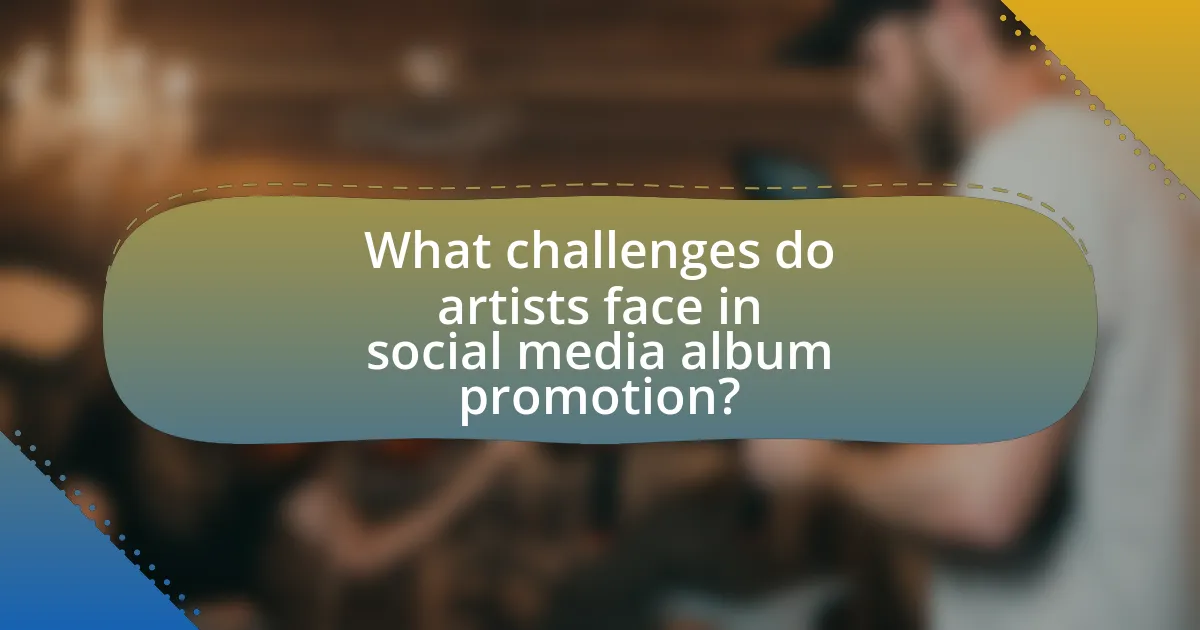
What challenges do artists face in social media album promotion?
Artists face several challenges in social media album promotion, including algorithm changes, oversaturation of content, and audience engagement. Algorithm changes on platforms like Instagram and Facebook can limit the visibility of posts, making it difficult for artists to reach their target audience effectively. Additionally, the oversaturation of content means that artists must compete with numerous other creators for attention, which can dilute their promotional efforts. Furthermore, maintaining audience engagement is crucial; artists often struggle to create consistent, compelling content that resonates with followers, leading to decreased interaction and interest in their albums. These challenges highlight the complexities artists encounter in leveraging social media for successful album promotion.
What are the common pitfalls in social media marketing for albums?
Common pitfalls in social media marketing for albums include inconsistent branding, lack of engagement with followers, and failure to utilize analytics effectively. Inconsistent branding can confuse potential listeners, as a cohesive visual and thematic identity is crucial for recognition. Lack of engagement with followers leads to missed opportunities for building a loyal fanbase; studies show that brands that actively interact with their audience see higher engagement rates. Additionally, failure to utilize analytics prevents artists from understanding their audience’s preferences and optimizing their marketing strategies accordingly, which can result in wasted resources and missed promotional opportunities.
How can artists avoid oversaturation in their promotional efforts?
Artists can avoid oversaturation in their promotional efforts by strategically planning their content and diversifying their promotional channels. By creating a content calendar, artists can space out their promotional activities, ensuring that they do not overwhelm their audience with too much information at once. Additionally, utilizing various platforms—such as social media, email newsletters, and live events—allows artists to reach different segments of their audience without relying solely on one medium. Research indicates that varied promotional strategies can enhance audience engagement and retention, as seen in a study by the University of Southern California, which found that diversified marketing approaches lead to a 30% increase in audience interaction compared to repetitive messaging.
What issues arise from negative feedback on social media?
Negative feedback on social media can lead to significant reputational damage for artists and their albums. This damage often manifests as decreased sales, loss of fan engagement, and a tarnished public image. For instance, a study by the Pew Research Center found that 70% of users have changed their opinion about a brand or artist based on negative comments or reviews on social media platforms. Additionally, negative feedback can create a hostile environment, discouraging potential fans from engaging with the artist’s work. This cycle of negativity can hinder promotional efforts and ultimately impact the success of album releases.
How can artists measure the effectiveness of their social media strategies?
Artists can measure the effectiveness of their social media strategies by analyzing key performance indicators (KPIs) such as engagement rates, follower growth, and conversion metrics. Engagement rates, which include likes, shares, and comments, provide insight into how well content resonates with the audience. For instance, a study by Sprout Social found that posts with higher engagement rates lead to increased visibility and reach, indicating a successful strategy. Follower growth reflects the expanding audience base, while conversion metrics, such as click-through rates to streaming platforms or merchandise sales, directly correlate with the effectiveness of promotional efforts. By systematically tracking these metrics, artists can assess and refine their social media strategies to enhance album promotion.
What metrics should artists track to evaluate success?
Artists should track metrics such as streaming numbers, social media engagement, ticket sales, and merchandise sales to evaluate success. Streaming numbers provide insight into how many listeners are engaging with an artist’s music, while social media engagement metrics, including likes, shares, and comments, indicate audience interaction and brand reach. Ticket sales reflect the artist’s ability to draw live audiences, and merchandise sales demonstrate the financial support from fans. According to a 2021 report by the International Federation of the Phonographic Industry, streaming accounted for 62% of the global recorded music revenue, highlighting its importance as a key metric for artists.
How can feedback from social media inform future promotional strategies?
Feedback from social media can inform future promotional strategies by providing real-time insights into audience preferences and engagement levels. Analyzing comments, shares, and likes allows marketers to identify which content resonates most with their target demographic, enabling them to tailor future campaigns accordingly. For instance, a study by Sprout Social found that 70% of consumers feel more connected to brands that engage with them on social media, highlighting the importance of responsive promotional strategies. By leveraging this feedback, brands can enhance their messaging, optimize content formats, and improve overall campaign effectiveness.
What best practices should artists follow for successful album promotion on social media?
Artists should engage their audience consistently and authentically for successful album promotion on social media. This involves creating a content calendar that includes regular updates, behind-the-scenes footage, and interactive posts to maintain interest. Research indicates that posts with images receive 650% higher engagement than text-only posts, highlighting the importance of visual content. Additionally, utilizing targeted ads can increase reach; for instance, Facebook’s advertising platform allows artists to target specific demographics, enhancing the effectiveness of promotional efforts. Collaborating with influencers or other artists can also expand visibility, as partnerships often lead to cross-promotion to diverse audiences.
How can artists create engaging content that resonates with their audience?
Artists can create engaging content that resonates with their audience by understanding their audience’s preferences and utilizing storytelling techniques. Research indicates that content that tells a story can increase audience engagement by up to 300%, as it fosters emotional connections. Additionally, artists should leverage social media analytics to tailor their content based on audience interactions, ensuring relevance and relatability. For instance, platforms like Instagram and TikTok provide insights into what types of posts generate the most engagement, allowing artists to refine their strategies effectively.
What are the key elements of a successful social media campaign for album launches?
The key elements of a successful social media campaign for album launches include strategic content planning, audience engagement, targeted advertising, and analytics tracking. Strategic content planning involves creating a content calendar that outlines posts leading up to the album release, including teasers, behind-the-scenes footage, and countdowns. Audience engagement is crucial; interacting with fans through comments, live sessions, and Q&A can foster a sense of community and anticipation. Targeted advertising ensures that promotional content reaches the right demographics, maximizing visibility and engagement. Finally, analytics tracking allows artists and marketers to measure the effectiveness of their campaigns, enabling data-driven adjustments for future promotions. These elements collectively enhance the reach and impact of an album launch on social media platforms.

